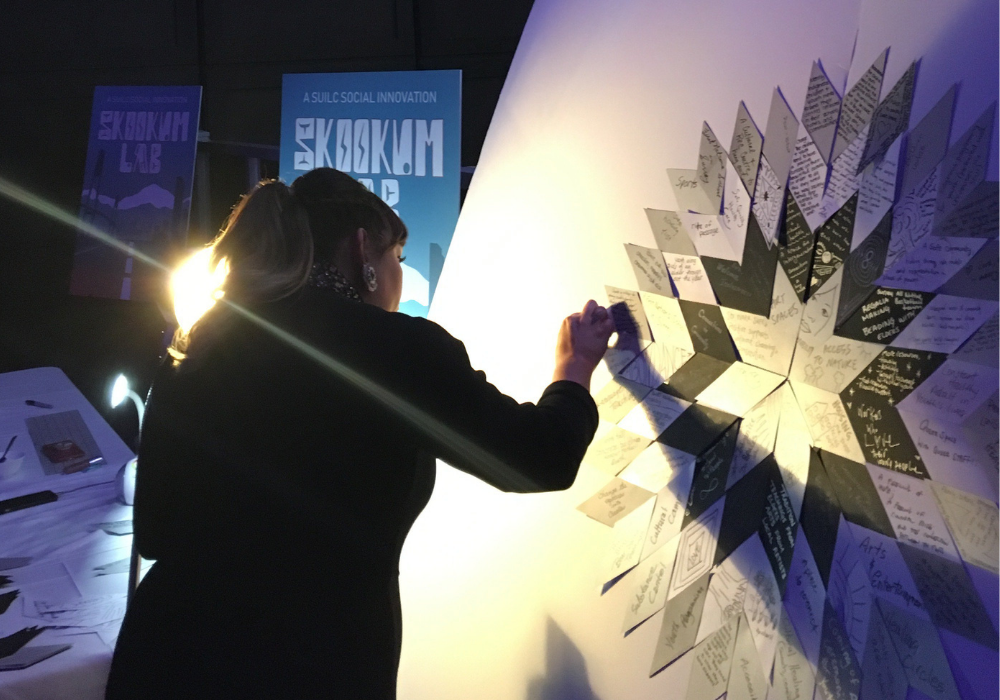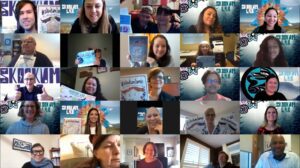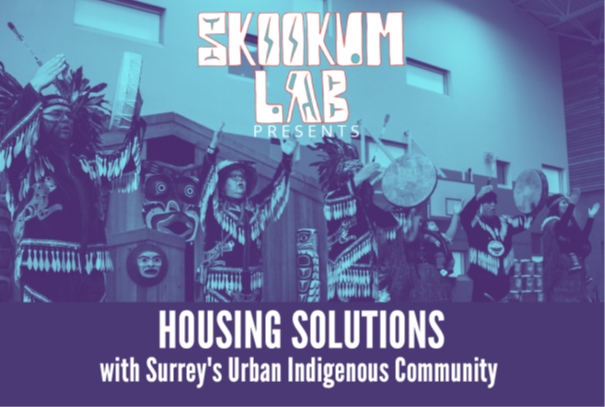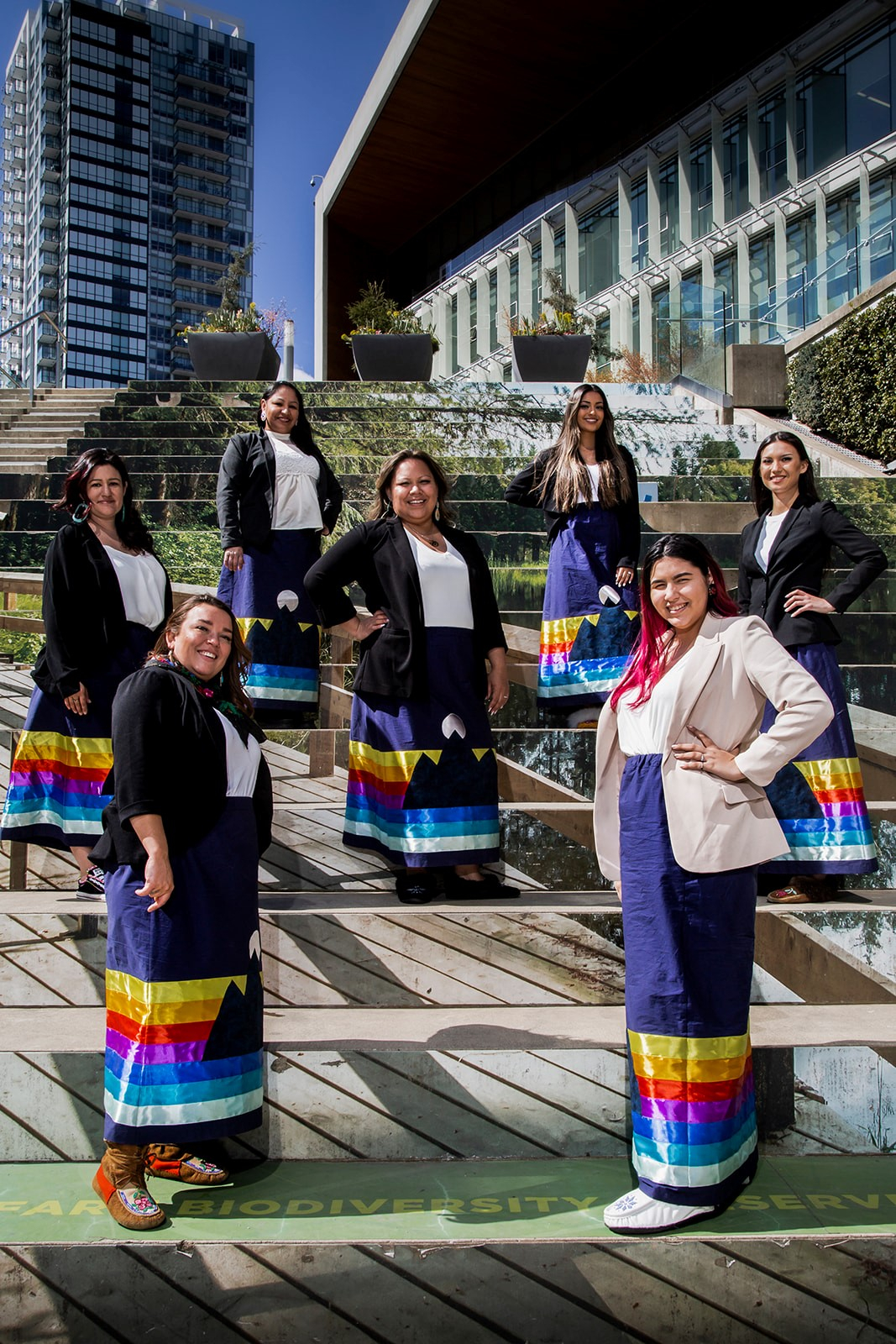
Centering Indigenous Wisdom in Social Innovation
Piecing together community voices in a method inspired by the Starblanket. Photo from Skookum Lab.
Story by Madeline Barber
The Skookum Lab ignited from a single, sobering statistic: that 45% of Indigenous children in Surrey live in poverty.
Surrey, which occupies the traditional lands of the Semiahmoo, Katzie, Kwikwetlem, Kwantlen, Qayqayt, and Tsawwassen First Nations, also has the largest and fastest-growing urban Indigenous population in BC.
Skookum Lab Co-Coordinator Sheldon Tetreault says his team couldn’t get that 45% number out of their heads: “Our group, the Surrey Urban Indigenous Leadership Committee (SUILC), wanted to make that a top priority and do something to address that,” he says.
That something turned into the Skookum Lab, an Indigenous-led social innovation lab driven by the question: “How can Surrey be a leading city to raise an Indigenous child?” Over approximately three years, the lab not only conducted community-led research and developed prototypes relating to this specific question, but fostered a more connected Indigenous community in Surrey that’s stronger than ever.
Indigenizing Social Innovation Labs
Tetreault and his team were initially wary of the lab concept, given the jargon-filled language typically used in social innovation, and the socio-economic position of those who tend to be involved in it—two things that wouldn’t be accepted by the community. With this awareness, they established some key principles to ensure the lab was a safe and accessible space, including community-based problem definitions and solutions and centering Indigenous wisdom.
“You can look from the smallest thing to the biggest thing in our lab, how we’ve Indigenized it,” Tetreault said on the Maybe podcast to host Cheryl Rose. Skookum Lab Co-Coordinator Jeska Slater (now Director, Indigenous Priorities at Vancouver Foundation) added that “first and foremost we wanted to honour the protocols of the land-based nations”.

Skookum Social Innovation Lab participants gathering online. Photo from Skookum Lab (original tweet ).
Some of the ways they accomplished this included re-envisioning community gatherings as campfires that included Coast Salish protocols and operating under a distributed leadership model. The campfires were a key component of the lab, allowing community members most affected by the issues to share their knowledge and experiences.
“We were so fortunate to have knowledge keepers and spiritual leaders and cultural ambassadors and chiefs and councillors from the land-based nations come into the process, and it really added that cultural and spiritual element that, as Indigenous People, are so central to our way of life, as our sacred law is grounded in accountability,” Slater shared on the podcast.
Innovative Methodologies Rooted in Indigenous Practices
The arts were woven into Skookum’s identity early on, from commissioning artist Whess Harman to create their logo, to designing community engagement activities. Engaging artists, said Slater, is what made the lab feel safe for a lot of the community to participate.
Slater drew on her background in the arts, and from the traditional teachings of her aunties from the Fisher River Cree Nation, to develop an innovative and effective methodology for gathering community voices inspired by Starblankets.
Based on the star design painted on buffalo robes, the Starblanket is considered a gift of high honour. Composed of individual geometric shapes, the pieces come together to make a singular and striking star. Using a strength-based and solution-focused approach, the lab invited community members on a number of occasions to share their experiences and hopes through a Starblanket exercise. Individuals wrote on a single geometric piece, ultimately contributing to a rich visual mosaic of community voices.
“What the Starblanket really represents is that the contribution of each individual is needed for our community to be healthy and thriving,” Slater also shared.
Changing Systems through Prototypes
Another integral component of Skookum Lab’s work was developing prototypes — plans involving creative and practical strategies to solve specific problems. The Skookum Lab originally planned to develop three scalable prototypes addressing child poverty in Surrey, but reached far beyond their initial goal to implement eight prototypes, some of which continue to grow. As Slater put it in their conversation with Cheryl Rose, “Indigenous People do a lot with a little.”
One prototype, focused on affordable housing, is an example of this: those involved in its development were able to leverage the infrastructure of Skookum Lab and turn it into its own affordable housing lab to further develop housing-specific solutions.

When it comes to the systems that are perpetrating some of these specific challenges, Tetreault says a major problem has been a lack of resource flow because people aren’t aware of the numbers. Even though Surrey has a larger Indigenous population than Vancouver there are only 270 non-market housing units for Indigenous people in Surrey—compared to 1,470 units for Indigenous people in Vancouver. This, says Tetreault, “demonstrates how the decisions around funding and allocation of resources are behind where the population is at today.”
Tetreault also adds that being able to do this “deeper dive into housing” has allowed them to bring forward these statistics to people in decision making roles. “It gives us the ability to be more effective advocates for change.”
Cultivating Cultural Wealth
While some thought a lab focused on child poverty would end up at income support for Indigenous families, Skookum Lab adapted and expanded to address what they were hearing from the community. “A lot of the feedback we were getting from people in the community was all about needing more culture and cultural identity, more community belonging, and an Indigenous sense of place in Surrey,” he says.
This discovery led to a more comprehensive approach to addressing poverty, one with a broader definition that included not just financial wealth, but cultural wealth as well—and the result has been a more unified community, or what Tetreault describes as “the creation of urban kinship networks.”

Photo from Skookum Lab.
Tetreault credits the funding they received from Vancouver Foundation for helping give them the time and space to develop these networks. The three-year grant they were awarded allowed them to build relationships that wouldn’t have been able to flourish in just one year. “We had the luxury of being able to really cultivate relationships in our community, which was something that’s been lacking, and that you just can’t do in a one-year funding cycle,” he says.
Impact with Momentum
Like the bolstered community connections, Skookum Lab’s work is continuing to create a ripple effect of positive change. “Through this lab process we have created and amplified the voice that’s here and you can’t turn that back down,” Tetreault said to Rose.
One of several examples of Skookum’s growing branches is their ambassador program, which has encouraged some community members to become leaders in advocacy for change. The program, which is currently composed of eight women across different generations, has partnered with the SFU Centre for the Study of Educational Leadership and Policy.
Thanks to a national research grant, the ambassadors will be working with SFU to co-develop urban Indigenous women’s leadership theory. Three of these ambassadors have since been hired as community researchers at SFU, and Slater says a film is also in the works.
Now that the three-year grant funding from Vancouver Foundation is complete, Skookum Lab will draw to a close.
“I know the lab is sort of coming to an end, but Skookum will continue, we’ve committed within the Surrey Urban Indigenous Leadership Committee to having the spirit, the approaches, the level of engagement to continue, and have even the brand Skookum continue, it’s just the lab will come to a close,” says Tetreault.
Follow the Surrey Urban Indigenous Leadership Committee on Twitter and Facebook .

